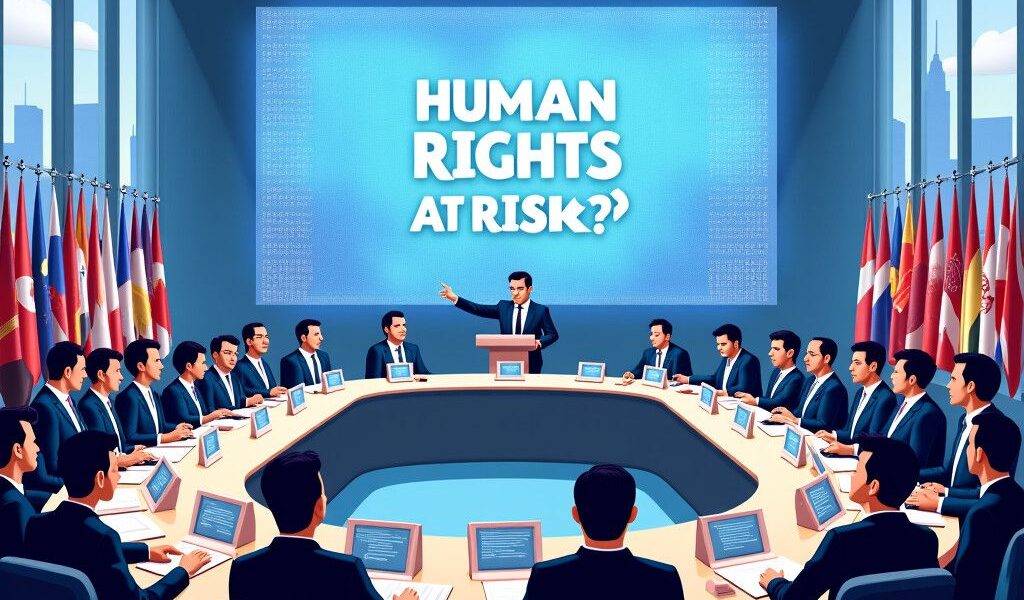Human Rights Concerns Over the UN Cybercrime Treaty Raised at IGF 2024
At the recent Internet Governance Forum (IGF) 2024, experts voiced serious human rights concerns surrounding the UN Cybercrime Treaty. This treaty, aimed at coordinating international efforts to combat cybercrime, has come under scrutiny for vague provisions that could threaten freedoms globally. Key discussions focused on how this treaty might empower authoritarian regimes while undermining efforts to protect civil liberties.
One of the main points of contention is the potential misuse of the treaty by governments to justify increased surveillance and censorship. Many experts argue that the language used in the treaty is broad enough to allow countries with a history of suppressing dissent to expand their surveillance apparatus under the guise of fighting cybercrime. For example, provisions that aim to facilitate the rapid exchange of data between countries could be misused to target political dissidents, activists, or journalists.
The speakers at IGF 2024 highlighted the alarming possibility that the treaty could become a tool for global repression. “Vague legal definitions can create a loophole for authoritarian governments to criminalize online expression. Freedom of speech could be jeopardized,” noted Maria Garcia, a prominent human rights lawyer. Such statements underscore concerns that legitimizing state-sponsored hacking or internet shutdowns may become commonplace as governments exploit the treaty.
Moreover, the discussions referenced increasingly oppressive measures in countries already known for their strict control over the internet. Countries like China and Russia have shown a willingness to clamp down on freedom of expression through legislation allowing digital authoritarianism. As noted by Dr. James Bennett, a cyber policy expert, “We are witnessing global trends where the definitions of cybersecurity and cybercrime may overshadow basic human rights of individuals online.”
In addition to the risks of digital censorship, the experts pointed to the potential for breaches of privacy. The treaty’s emphasis on data sharing may lead to greater surveillance of individuals. The balance between enforcing laws against cybercrime and respecting the privacy of citizens must be carefully managed. Missteps could result in a power imbalance favoring government authorities over personal freedoms.
Existing international legal frameworks provide insufficient protection against such repressive actions. The discourse emphasized that to avoid these pitfalls, it is essential for the UN and member countries to prioritize human rights when drafting and implementing the treaty. “A human rights-centric approach to cybersecurity must be prioritized. We need clear, binding obligations to protect freedoms rather than erode them,” stated Dr. Elizabeth Reynolds, an expert in digital rights.
The discussions at IGF 2024 come at a critical time as the digital landscape continues to evolve. With the rapid growth of social media and the internet, legal instruments formed decades ago may lack the adaptability to address new challenges effectively. Stakeholders are urged to engage critically with the treaty’s provisions, advocating for a framework that promotes safety without compromising human rights.
The key takeaway from IGF 2024 is that the intersection of cybersecurity and human rights requires both vigilance and action. As nations consider ratifying the UN Cybercrime Treaty, it is essential to ensure that it does not come at the expense of the freedoms that billions of individuals around the world rely on. Continued advocacy for transparency and accountability in how cyber activities are monitored and regulated is necessary to create a safe and open internet.
As discussions surrounding the treaty intensify, stakeholders must remain united in their pursuit of preserving human rights in the face of mounting digital threats. The road ahead will depend on holding governments accountable and ensuring that policy frameworks do not undermine the very rights they purport to protect.








